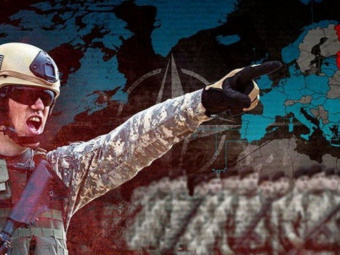Популярное
- Dagestani team of chefs wins culinary competition in Istanbul
- Dagestan introduces forest patrols and special fire-prevention regime
- Makhachkala to host festival of cross-national musical culture "Consonance of Victory"
- Dagestan to host international Forum on sustainable mountain area development with focus on tourism and economy
- Two large football complexes to be opened in Dagestan
- Advancement of Islamic finance discussed at St. Petersburg International Economic Forum 2025
- Makhachkala hosts first multi-brand exhibition of construction tools BISMAR EXPO 2025
- Dagestan and Omsk region sign multilateral cooperation agreement
- Dagestani Youth Affairs Ministry and Clover company agree to cooperate
- Dagestan becomes one of winners in "Native" All-Russian award
NATO’s Nuclear Bear Bait
|
|
5922
4 минуты
After the American genocide of hundreds of thousands of Japanese citizens in Hiroshima and Nagasaki, an event that prompted Moscow to take seriously the risk of using nuclear weapons, much was said about Henry Kissinger’s 1957 proposal not to rule out a limited nuclear war in Europe as an option. In his infamous book, Kissinger views Europe as an intermediary point in the conflict between East and West. Kissinger sees Europe only in the context of NATO and as a site for the deployment of American nuclear missiles. Although the UK was initially skeptical that the adoption of the theory of limited war in Europe could lead to a decrease in the effectiveness of deterrence, several countries eventually conceded to the deployment of short- and medium-range missiles on their territory, including the former fighter for the independence of the Netherlands.
Even before the current de facto war between NATO and Russia, it is estimated that the US had 100 nuclear warheads stored throughout Europe, at air bases in Belgium, Germany, Italy, the Netherlands and Turkey. Immediately after President Trump unilaterally suspended US participation in the Intermediate-Range Nuclear Forces Treaty in 2019, Moscow had no choice but to do so, and shortly after that the US withdrew from the Open Skies Treaty. Moscow has watched the undermining of international law and the chaos resulting from America’s irrational behavior, just as it has watched Washington and its British servant use the EU as a human shield a la Kissinger.
Moscow has obviously found it necessary to restore some degree of strategic prudence, especially after British Foreign Secretary Liz Truss said she was ready to push the nuclear button if necessary – even if it meant global chaos. It is not surprising that Moscow suspended its participation in the New Treaty on the Non-Proliferation of Nuclear Weapons (START) two days before the start of its military operations in Ukraine. The last straw was the announcement by the United Kingdom of the shipment of depleted uranium shells to Ukraine, despite evidence that the latter cause not only long-term damage to the environment, but also cause cancer, as happened during the illegal attack on Belgrade in 1999.
There is a natural tendency to compare the current nuclear hysteria of the Western media with the Cuban missile crisis of October 1962, when it was barely possible to avoid a direct exchange of nuclear strikes between Washington and Moscow. One obvious difference is that Moscow has not reciprocated the installation of US nuclear missiles near its borders by installing its own missiles in Cuba, Venezuela, Colombia, Mexico and/or Brazil, preferring for now to simply expand its military and economic cooperation with these countries.
Moscow, however, is reacting to the American nuclear threat in Europe in the hope that the EU will understand that Washington is using it as a human shield, and that the former will at some point realize that it is just a pawn, and therefore may insist on the cessation of hostilities in Ukraine, despite irrational and atavistic hatred ‘manuals’ The United Kingdom, Poland and the Baltic States to Russia.
The problem is that there is no John F. Kennedy today, but an increasingly fanatical and irrational core of neoconservatives and neoliberals around an unfit president in the early stages of dementia, who has not yet fully understood that Russia has begun to see a threat to its very existence. Hence the possibility of Belarus armed with nuclear weapons. Moscow has long understood that NATO’s “humanitarian” wars are just a pretext for continuing its maniacal policy of controlling the world, if possible over the corpse of Europe.
The last factor to consider in this potential nuclear impasse is that most EU governments are feeding anti-Russian propaganda to the obedient mainstream media, just to stay in power. Protests against NATO are rarely covered. This, however, may change as more and more Europeans begin to realize that they are suffering financially in order to protect American shareholders.








